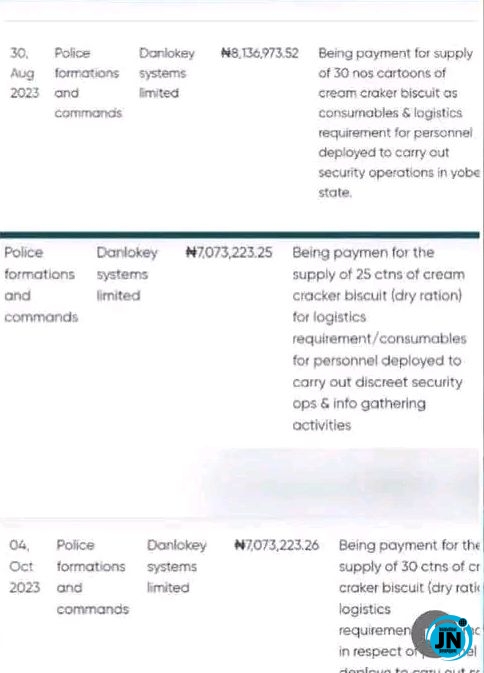The Nigeria Police Force has reportedly spent a staggering N22.282 million on 85 cartons of cream cracker biscuits, a figure that has ignited widespread discussion online and raised questions about public spending priorities. The purchases, intended for personnel on duty, spanned the period from August to October 2023, highlighting the agency’s budgetary allocations for consumables during security operations across different states.
Specifically, on August 30, 2023, the Nigeria Police Force spent N8.136 million on 30 cartons of biscuits to support security operations in Yobe State. Later, on October 4, 2023, an additional N7.073 million was spent on another 30 cartons intended for personnel, while the same amount, N7.073 million, was allocated for 25 cartons of biscuits to cover logistics requirements and other consumables. The breakdown of these expenses has emerged online, prompting reactions from Nigerians concerned about transparency and fiscal responsibility.
The public’s reaction to the reported spending has been a mix of disbelief, humor, and criticism:
Rey commented, “Wow, biscuits that must come with police escorts, a bulletproof wrapper, and maybe even the Commissioner’s autograph. At ₦280k per carton, I hope they at least crack crime better than they crack teeth.”
OG KingPikin wrote, “280k for one carton of biscuit? 😂 Na the same biscuit wey dey soak for tea till e melt like PDP structure?”
Ambiug joked, “The biscuit is sold in Dollars and it’s imported😂.”
Nosa added, “280k for a single carton of biscuits? This speaks to either reckless spending or outright corruption. Nigerians deserve accountability on how public funds are being used.”
The revelations have intensified debates about financial prudence within government institutions and the Nigeria Police Force in particular, with many citizens calling for stricter oversight of public expenditure to prevent misuse of funds allocated for consumables and operational support.
See reactions below…

The conversation continues online as Nigerians weigh the implications of such high spending on everyday items like biscuits while critical infrastructure, security, and social services face funding challenges. Questions remain about procurement processes, vendor selection, and whether similar purchases are common practice across other government agencies.